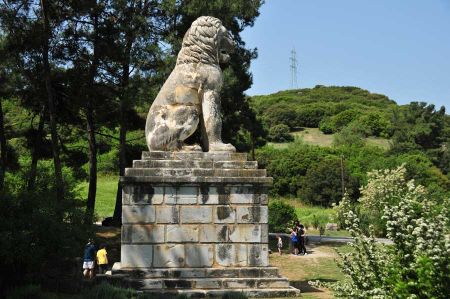Amphipolis - Greek colonization in North Aegean
- Written by Portal Editor
The term "Greek colonization" refers to the founding of Greek planting towns (Apoikia) extending from the mainland and the islands of the Aegean before and during the archaic period of Greek antiquity.
Through this colonization the Greek language, culture and polis were spread, especially in the coasts of the Mediterranean and the Black Sea. There are essentially two phases: the "Ionian colonization" of the small Asian coasts, as evidenced by the excavations along the coast of today's Turkey, which occurred in the 11th and 10th century BC, followed by the end of the Mycenaean culture, as well as the "Great Colonization" from the 8th to the 6th century BC, which meant that the Greek settlement area stretched from Spain to the Caucasus and from southern Russia to Egypt.
First wave of Greek colonization throughout the 7th century
The founding of the colonies in the northern Aegean had, of course, preceded a period of exploration, contact, and trade with the indigenous population. The first to travel to this region were apparently the Eubians, especially the inhabitants of Eretria and Chalcis, the latter group giving the peninsula its name. In fact, the majority of the colonies were founded by the Eubès, the earliest, Methonè, at the beginning of the 8th century BC. Colonists from two Cyclades Islands participated in this new settlement. The inhabitants of Paros have established themselves on the island of Thasos, while others, who came from the island of Andros, founded four colonies, three of them (Sanè, Akanthos and Stageira) on the easternmost part of the Halkidiki peninsula, the fourth, Argilos few kilometers west of the river Strymonas.

Later Greek authors such as Herodotus, Thucydides and Strabon
While the modern image of so-called colonization has been marked for a long time by the depiction of the events by later Greek authors such as Herodotus, Thucydides and Strabon, the results of classical archeology have in recent years cast new light on the events. Many confident assumptions were questioned. The research discussion continues.
In the latest research, with reference to the archaeological findings, it is increasingly assumed that, roughly speaking, one had to deal with two phases: until about 600 the number of migrant Greeks had been small; They would have settled mostly as traders and craftsmen beside and in already existing indigenous settlements. Only then, as a second settlement wave, a large number of Hellenes had emigrated, carried on farming and displaced or subjugated the locals, often led by an oikist. "
Please read as well:
Alexander the Great - Conquerer from Pella
The legendary Xerxes Canal on Halkidiki
-
-
-
-
-
-
-
-
-
-
-
-
https://www.alaturka.info/en/history/ancient-history/3993-amphipolis-greek-colonization-in-north-aegean/amp#sigProIdf824810583